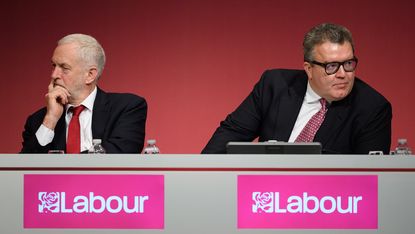Could Labour split over Brexit?
Jeremy Corbyn’s failure to back a second referendum could have drastic consequences

The threat of a party split is looming larger over Labour amid growing dissatisfaction stemming from Jeremy Corbyn’s continued refusal to back a second Brexit referendum.
The Labour leader is struggling to quell calls for a so-called People’s Vote from a significant faction within the party, as the clock ticks down towards the UK’s scheduled exit from the EU on 29 March.
Some Labour MPs are warning that 27 February, the date of the next round of voting on Theresa May’s Brexit deal, could be D-day for Corbyn.
Subscribe to The Week
Escape your echo chamber. Get the facts behind the news, plus analysis from multiple perspectives.

Sign up for The Week's Free Newsletters
From our morning news briefing to a weekly Good News Newsletter, get the best of The Week delivered directly to your inbox.
From our morning news briefing to a weekly Good News Newsletter, get the best of The Week delivered directly to your inbox.
“Several junior shadow ministers have said they are prepared to resign their posts if Corbyn doesn’t whip his MPs to vote for a pro-referendum amendment at the end of the month,” reports The Guardian.
At least six backbenchers have allegedly been holding regular conversations in recent weeks about forming a new, pro-EU centrist party.
“I’ve talked to them lots of times and they are just so angry,” an unnamed Labour MP told the Financial Times. “They aren’t listening any more. It sounds like nothing will stop them breaking away.”
According to the newspaper, one idea is for a ringleader to quit Labour and call a by-election, to prove that the new party could “win elections”. They would then seek to recruit others to the breakaway group.
The divisions “bubbling under Labour’s carefully balanced Brexit strategy may finally be coming to the fore”, says Politico’s Jack Blanchard.
“The problem for Corbyn, of course, is he would also face a slew of resignations if he does back a second referendum,” Blanchard adds.
Corbyn ally Len McCluskey, general secretary of the Unite union, risked stoking the conflict in the party this week when he argued that stopping Brexit was “not the best option for our nation”.
“My view is that, having had a 2016 referendum where the people have voted to come out of the EU, to try and deflect away from that threatens the whole democratic fabric on which we operate,” he told ITV’s Robert Peston. “I’m saying that in reality it is not the best option for our nation.”
Brexit “has always had the potential to redraw the political lines beyond a period of parliamentary turmoil”, and as tensions approach a peak, “perhaps the permanent lines will genuinely break”, says the BBC’s Laura Kuenssberg.
Why now?
The issue stems from Labour’s position on Brexit. The party agreed at its annual conference in September that a second referendum could be considered if there was not a general election. However, Corbyn “is publicly lukewarm about the idea and is facing intense pressure from some within the party to change course”, says The Times.
Last month, Labour’s shadow Brexit secretary Keir Starmer said that backing a second referendum was the only “remaining option” if Labour’s own withdrawal plan is defeated, adding: “That is a very important commitment. And it is one we will keep.”
The Independent reports that this view was echoed by shadow foreign secretary Emily Thornberry, who said: “If [May] refuses a general election and to change her deal, then of course our policy is that we will go for a people’s vote.”
Meanwhile, People's Vote-advocate David Lammy told Sky News: “You cannot argue that you undermine democracy with more democracy. We have now seen that the deal has not gone through, that a vote of confidence has not been successful. There is no point continuing with votes of confidence and throwing darts that keep missing the board.”
The threat for the party comes if Corbyn refuses to bow to this pressure, says ITV’s Robert Peston.
If Labour “is seen to have failed to act decisively to prevent an abrupt and chaotic rupture with the EU, the long-mooted day when centre-ground Labour MPs pack their bags and quit Corbyn’s Labour Party will be hastened”, Peston writes in a post on Facebook.
So will it happen?
Peston believes Labour’s shadow chancellor John McDonnell who cast the deciding vote on whether the party backs a second referendum.
“With a clear majority of Labour members and supporters backing a referendum and an even greater majority opposing a hard Brexit, that leads most of those close to McDonnell to conclude he’ll ultimately side with Starmer,” Peston says.
Another factor in favour of that outcome is the unwillingness of most Labour MPs “to even consider quitting the party, given the legacy of the Social Democratic Party - set up in 1983”, says the Financial Times.
Even Lammy admits that “the danger is that, just like 1983, a new party built around a relationship with Europe keeps the Labour Party out of power for a generation”.
“I’m not philosophically opposed to a split,” another Labour MP told the New Statesman’s Stephen Bush last year. “What I am opposed to is splitting the left vote and letting the Tories in, and I can’t work out how you can know for sure that you aren’t risking that in advance.”
Create an account with the same email registered to your subscription to unlock access.
Sign up for Today's Best Articles in your inbox
A free daily email with the biggest news stories of the day – and the best features from TheWeek.com
-
 Nigeria's worsening rate of maternal mortality
Nigeria's worsening rate of maternal mortalityUnder the radar Economic crisis is making hospitals unaffordable, with women increasingly not receiving the care they need
By Harriet Marsden, The Week UK Published
-
 'Elevating Earth Day into a national holiday is not radical — it's practical'
'Elevating Earth Day into a national holiday is not radical — it's practical'Instant Opinion Opinion, comment and editorials of the day
By Harold Maass, The Week US Published
-
 UAW scores historic win in South at VW plant
UAW scores historic win in South at VW plantSpeed Read Volkswagen workers in Tennessee have voted to join the United Auto Workers union
By Peter Weber, The Week US Published
-
 Will Aukus pact survive a second Trump presidency?
Will Aukus pact survive a second Trump presidency?Today's Big Question US, UK and Australia seek to expand 'game-changer' defence partnership ahead of Republican's possible return to White House
By Sorcha Bradley, The Week UK Published
-
 Britain's biggest political donors
Britain's biggest political donorsThe Explainer With the 2024 general election set to be the highest-spending contest ever we look at who is giving to which party and why
By The Week UK Published
-
 It's the economy, Sunak: has 'Rishession' halted Tory fightback?
It's the economy, Sunak: has 'Rishession' halted Tory fightback?Today's Big Question PM's pledge to deliver economic growth is 'in tatters' as stagnation and falling living standards threaten Tory election wipeout
By Harriet Marsden, The Week UK Published
-
 What will £28bn green investment U-turn cost Labour?
What will £28bn green investment U-turn cost Labour?Today's Big Question Dropping flagship pledge 'will confirm workers' scepticism of the endless promises of jam tomorrow', said union leader
By The Week UK Published
-
 Stormont power-sharing in sight: 'good news' for Northern Ireland?
Stormont power-sharing in sight: 'good news' for Northern Ireland?Talking Point Unionists vote to end two-year boycott after agreeing legislative package to address post-Brexit trading arrangements
By The Week UK Published
-
 Why your local council may be going bust
Why your local council may be going bustThe Explainer Across England, local councils are suffering from grave financial problems
By The Week UK Published
-
 Rishi Sunak and the right-wing press: heading for divorce?
Rishi Sunak and the right-wing press: heading for divorce?Talking Point The Telegraph launches 'assault' on PM just as many Tory MPs are contemplating losing their seats
By Keumars Afifi-Sabet, The Week UK Published
-
 How many seats do Labour and the Tories need to win?
How many seats do Labour and the Tories need to win?In depth Changes to constituency boundaries mean Labour needs even bigger swing at next election to form a majority
By Sorcha Bradley, The Week UK Published